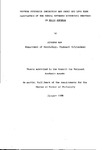PROTEIN SYNTHESIS INHIBITION AND SHORT AND LONG TERM HABITUATION OF THE DORSAL ANTENNAE WITHDRAWAL RESPONSE IN HELIX ASPERSA
| dc.contributor.author | RAY, STEPHEN | |
| dc.contributor.other | School of Psychology | en_US |
| dc.date.accessioned | 2013-11-19T11:46:34Z | |
| dc.date.available | 2013-11-19T11:46:34Z | |
| dc.date.issued | 1988 | |
| dc.identifier | NOT AVAILABLE | en_US |
| dc.identifier.uri | http://hdl.handle.net/10026.1/2754 | |
| dc.description.abstract |
The pharmacological disruption of memory by various protein synthesis inhibitory drugs (PSIs) has implicated protein synthesis as a requirement for long term learning but not for short. However, evidence derived from PSI research remains equivocal, with the apparent amnesic effects of PSIs being attributed to drug side-effects and general behavioural debilitations. Research reported in this thesis investigates the behavioural effects on short and long term habituation of the dorsal antennae withdrawal reflex in the snail (Helix aspersa) of three antibiotic drugs known to reversibly inhibit protein synthesis; anisomycin, actinomycin D, and puromycin. Initially, habituation was established as true learning in the snail and was demonstrated to be capable of retention for over 24 hours from one training session and over 6 months from a series of training sessions. The parametric characteristics of both short and long term habituation in the snail was established and found to be identical to those demonstrated in vertebrate habituation. Such characteristics were found to be different for short and long term habituation. Injection of PSIs showed no effect on short term habituation but disrupted long term habituation if PSI was active within a 'critical time window' during or for approximately 40 minutes after training. Later injections had no amnesic effect, and neither did injections 2 hours prior to training. The amnesic effects were demonstrated not to be attributable to drug side-effects by the development and application of a 'behavioural test battery' to screen general snail behaviour for drug induced debilitations at a variety of doses. Dose/amnesic effect relationships are also reported. Potentially confounding effects, such as, state dependent learning, and drug performance effects, were controlled out. The effects of the PSIs on short and long term habituation are then reported in terms of their effects on the established short and long term parametric characteristics of the learning. Drug injected snails showed normal short term parametric characteristics in training. However, in a long term retest drug treated snails also showed the parametric characteristics of short term habituation which demonstrated the degree of induced amnesia. The results are discussed in terms of a gene expression model of long term habituation and suggest that short and long term habituation are mediated by different processes. Short term habituation is protein synthesis independent and long term habituation is protein synthesis dependent. | en_US |
| dc.language.iso | en | en_US |
| dc.publisher | University of Plymouth | en_US |
| dc.title | PROTEIN SYNTHESIS INHIBITION AND SHORT AND LONG TERM HABITUATION OF THE DORSAL ANTENNAE WITHDRAWAL RESPONSE IN HELIX ASPERSA | en_US |
| dc.type | Thesis | |
| plymouth.version | Full version | en_US |
| dc.identifier.doi | http://dx.doi.org/10.24382/3944 | |
| dc.identifier.doi | http://dx.doi.org/10.24382/3944 |
Files in this item
This item appears in the following Collection(s)
-
01 Research Theses Main Collection
Research Theses Main


